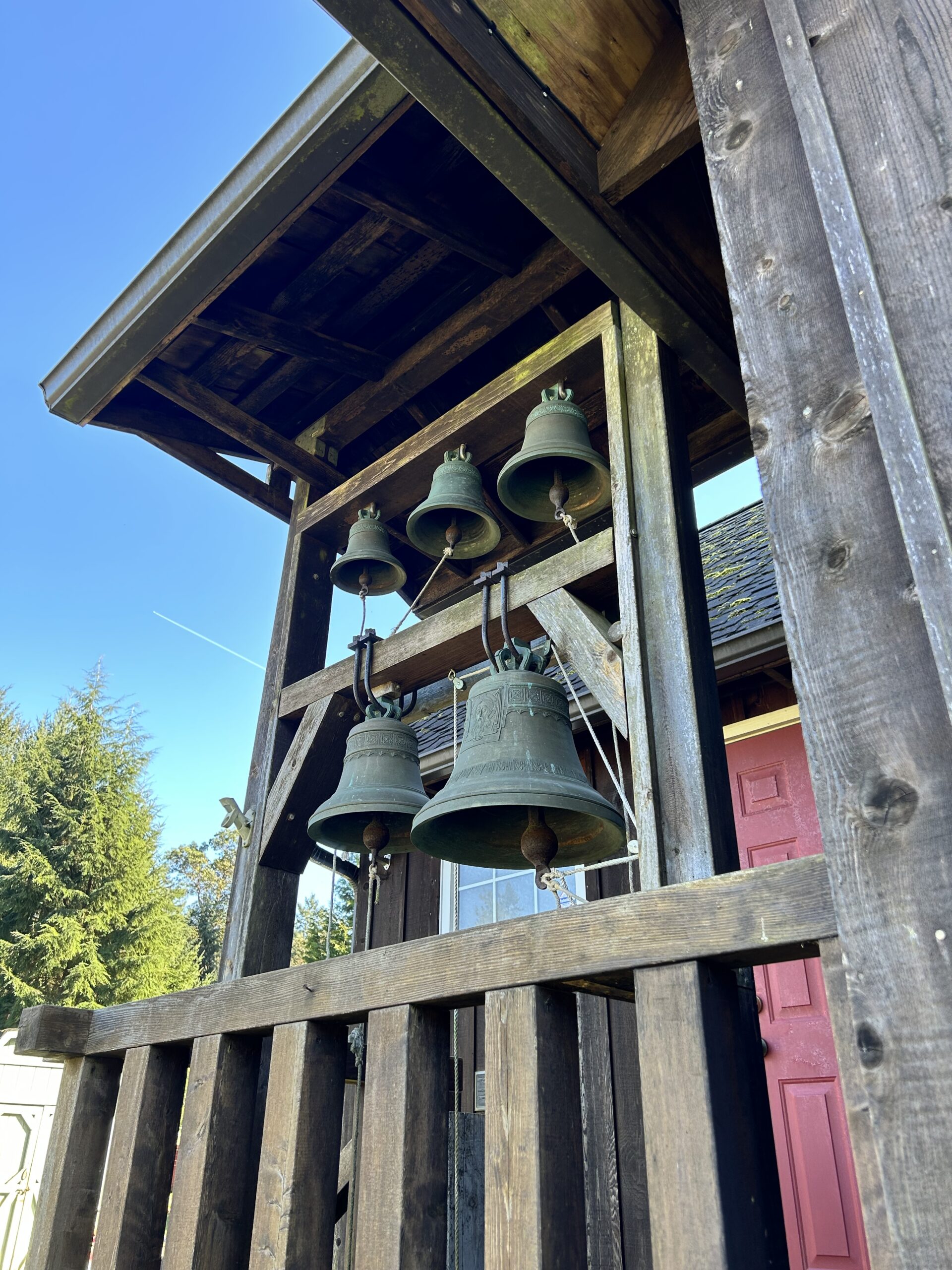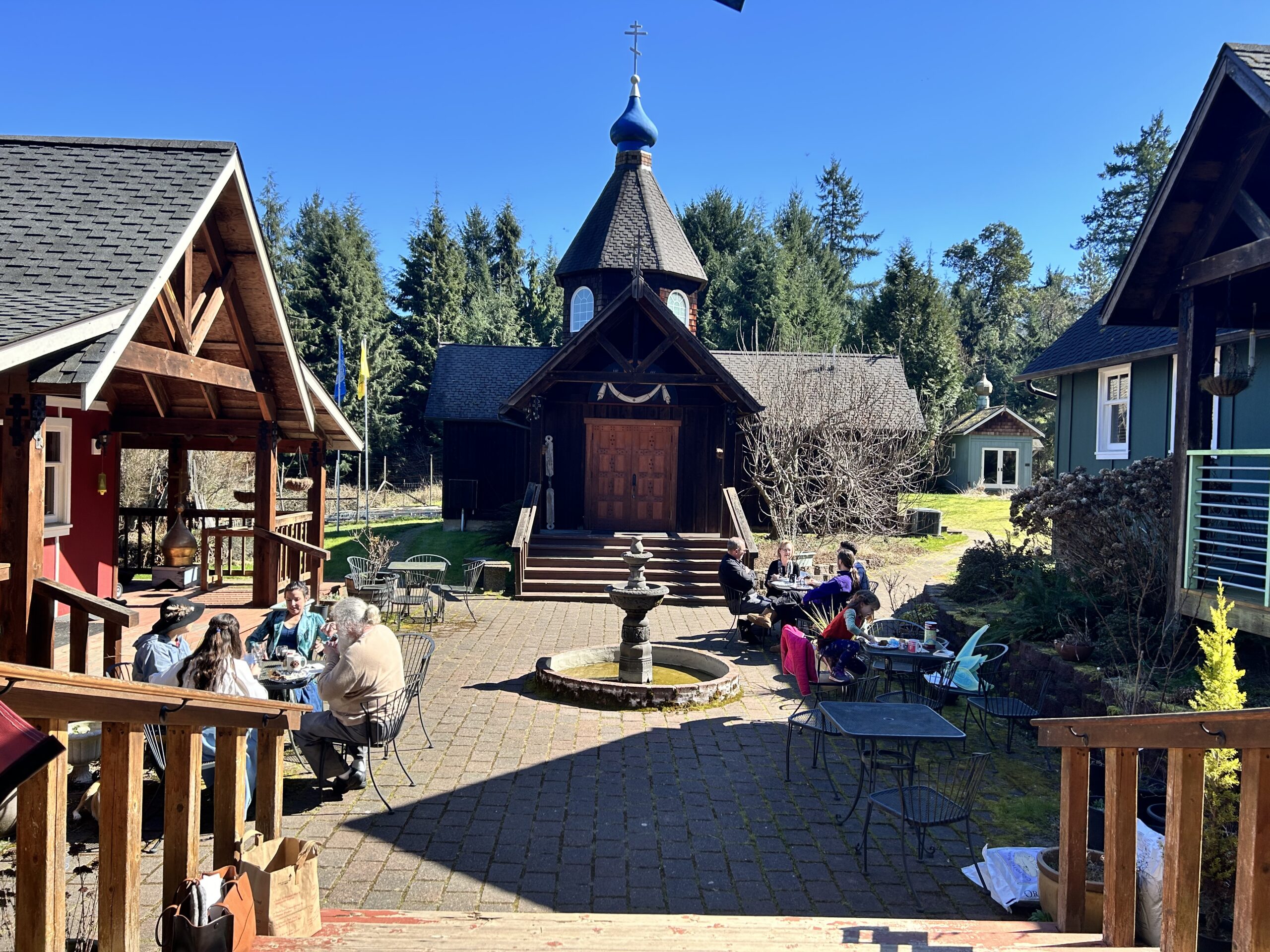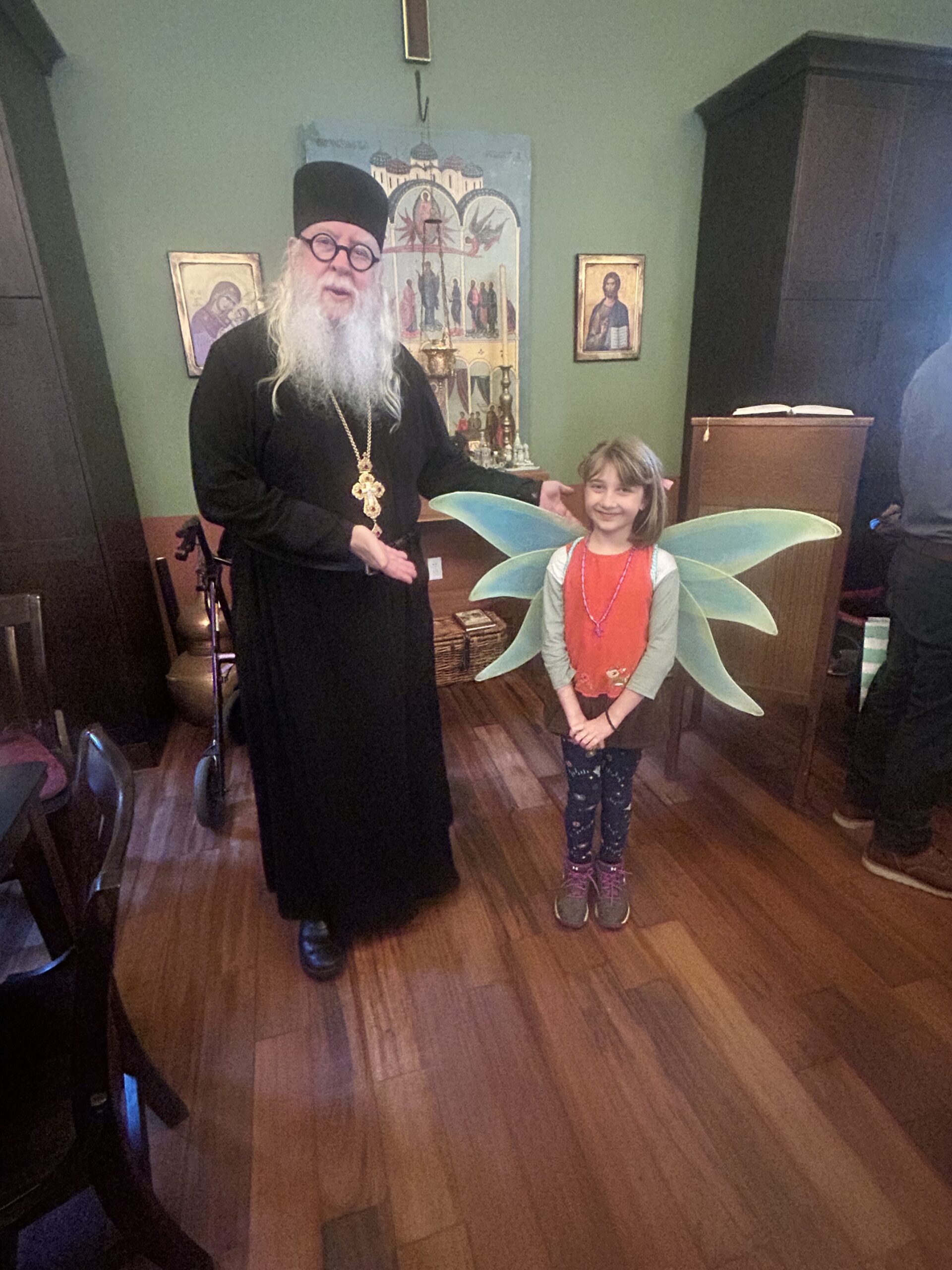The Role of Saints in the Life of a Christian

Growing up Lutheran I always believed the veneration of saints by Roman Catholics and Orthodox Christians was a form of idolatry. They were idolaters because they “worshiped saints”. This worship of the saints was a major stumbling block for most protestants, since worship was only to be offered to God. The distinction between veneration and adoration was unknown to us. Adoration is reserved for God alone, while veneration is the respect we show to the saints.
The historic Church has always venerated the saints because the Church is undivided. The Church Triumphant (in heaven) and the Church Militant (on earth) is one, undivided. When the Church is at worship the cloud of witnesses (those who’ve won the battle and are in heaven with God) are united in this worship before the Throne of God with those on earth. When we enter into the communal worship of the Church here on earth, we are mystically united with the saints in heaven. Death does not separate us from those who’ve gone on before us, for in Christ, there is no death.
The saints being alive in Christ are not dead. When we venerate the saints we are showing love and respect to those who’ve gone on before us. Kissing an icon of a saint is much the same as kissing a bible. We show our love and respect for the Word of God by offering a kiss, just as we do when expressing our love of our mother or grandmother. When we kiss a photo of a loved one we are not worshiping the person, but demonstrating in a concrete way our love for the person. This is the very thing we are demonstrating when we kiss the icon of a saint.
When we are in need of prayer we don’t head for the nearest tavern and ask the man slumped over the bar to pray for us (God may not have heard from this fellow for a very long time), rather we ask for prayers of those who are close to God. No one is closer to God than those who’ve lived holy lives, or who have died as martyrs, so we know they are alive in Christ, and have His ear. We don’t just ask a friend, we ask a saint to pray for us because Christ is glorified in His saints (2 Thessalonians 1:10).
With love in Christ,
Abbot Tryphon

Monday March 18, 2024 / March 5, 2024
Beginning of the Great Lent. Tone eight.
Great Lent. By Monastic Charter – Full abstention from food
Clean Monday.
Martyr Conon of Isauria (2nd c.).
St. Nicholas (1919).
New Hieromartyr John priest and New Hieromartyrs Mardarius and Theophanes (1938).
St. Nicholas (Velimirovich), bishop of Ochrid and Zhicha, Serbia (1956) (Serbia).
Uncovering of the relics (1996) of St. Luke, hierarch-surgeon of Simferopol (1961).
Translation of the relics (1463) of St. Theodore, prince of Smolensk and Yaroslav (1299), and his children Sts. David (1321) and Constantine.
Monk-martyr Adrian, abbot of Poshekhonye (1550) and his fellow-ascetic St. Leonidas (1549).
Martyr Onisius of Isauria (2nd c.).
Martyr Conon the Gardener of Pamphylia (251).
Virgin-martyr Irais (Rhais) of Antinoe in Egypt (3rd c.) and with her Martyr Archelaus and 152 Martyrs in Egypt.
Martyr Eulogius of Palestine.
Martyr Eulampius of Palestine.
Venerable Mark the Faster of Egypt (5th c.).
Venerable Hesychius the Faster of Bithynia (790).
“Nurtured Up-Bringing” Icon of the Mother of God.
New Martyr John the Bulgarian (Mt. Athos), at Constantinople (1784) (Greek).
Martyr Archelaus and 152 Martyrs in Egypt.
St. Kieran (Ciaran) of Saigher, Munster (Ireland) (5th-6th c.) (Celtic & British).
St. Theophilus, bishop of Caesaria in Palestine (200).
St. Virgil, archbishop of Aries (618).
Sts. Basil (1249) and Constantine (1257), princes of Yaroslavl.
New Hieromartyr Parthenius, Bishop of Didymoteichon in Thrace (1805).
New Martyr George of Rapsana (1818).
St. Piran, mont of Perranporth.

The Scripture Readings
Isaiah 1:1-20
Judah Called to Repentance
1 The vision of Isaiah the son of Amoz, which he saw concerning Judah and Jerusalem in the days of Uzziah, Jotham, Ahaz, andHezekiah, kings of Judah.
The Wickedness of Judah
2 Hear, O heavens, and give ear, O earth!
For the Lord has spoken:
“I have nourished and brought up children,
And they have rebelled against Me;
3 The ox knows its owner
And the donkey its master’s crib;
But Israel does not know,
My people do not consider.”
4 Alas, sinful nation,
A people laden with iniquity,
A brood of evildoers,
Children who are corrupters!
They have forsaken the Lord,
They have provoked to anger
The Holy One of Israel,
They have turned away backward.
5 Why should you be stricken again?
You will revolt more and more.
The whole head is sick,
And the whole heart faints.
6 From the sole of the foot even to the head,
There is no soundness in it,
But wounds and bruises and putrefying sores;
They have not been closed or bound up,
Or soothed with ointment.
7 Your country is desolate,
Your cities are burned with fire;
Strangers devour your land in your presence;
And it is desolate, as overthrown by strangers.
8 So the daughter of Zion is left as a booth in a vineyard,
As a hut in a garden of cucumbers,
As a besieged city.
9 Unless the Lord of hosts
Had left to us a very small remnant,
We would have become like Sodom,
We would have been made like Gomorrah.
10 Hear the word of the Lord,
You rulers of Sodom;
Give ear to the law of our God,
You people of Gomorrah:
11 “To what purpose is the multitude of your sacrifices to Me?”
Says the Lord.
“I have had enough of burnt offerings of rams
And the fat of fed cattle.
I do not delight in the blood of bulls,
Or of lambs or goats.
12 “When you come to appear before Me,
Who has required this from your hand,
To trample My courts?
13 Bring no more futile sacrifices;
Incense is an abomination to Me.
The New Moons, the Sabbaths, and the calling of assemblies—
I cannot endure iniquity and the sacred meeting.
14 Your New Moons and your appointed feasts
My soul hates;
They are a trouble to Me,
I am weary of bearing them.
15 When you spread out your hands,
I will hide My eyes from you;
Even though you make many prayers,
I will not hear.
Your hands are full of blood.
16 “Wash yourselves, make yourselves clean;
Put away the evil of your doings from before My eyes.
Cease to do evil,
17 Learn to do good;
Seek justice,
Rebuke the oppressor;
Defend the fatherless,
Plead for the widow.
18 “Come now, and let us reason together,”
Says the Lord,
“Though your sins are like scarlet,
They shall be as white as snow;
Though they are red like crimson,
They shall be as wool.
19 If you are willing and obedient,
You shall eat the good of the land;
20 But if you refuse and rebel,
You shall be devoured by the sword”;
For the mouth of the Lord has spoken.
Genesis 1:1-13
The History of Creation
1 In the beginning God created the heavens and the earth. 2 The earth was without form, and void; and darkness was on the face of the deep. And the Spirit of God was hovering over the face of the waters.
3 Then God said, “Let there be light”; and there was light. 4 And God saw the light, that it was good; and God divided the light from the darkness. 5 God called the light Day, and the darkness He called Night. So the evening and the morning were the first day.
6 Then God said, “Let there be a firmament in the midst of the waters, and let it divide the waters from the waters.” 7 Thus God made the firmament, and divided the waters which were under the firmament from the waters which were above the firmament; and it was so. 8 And God called the firmament Heaven. So the evening and the morning were the second day.
9 Then God said, “Let the waters under the heavens be gathered together into one place, and let the dry land appear”; and it was so. 10 And God called the dry land Earth, and the gathering together of the waters He called Seas. And God saw that it was good.
11 Then God said, “Let the earth bring forth grass, the herb that yields seed, and the fruit tree that yields fruit according to its kind, whose seed is in itself, on the earth”; and it was so. 12 And the earth brought forth grass, the herb that yields seed according to its kind, and the tree that yields fruit, whose seed is in itself according to its kind. And God saw that it was good. 13 So the evening and the morning were the third day.
Proverbs 1:1-20
The Beginning of Knowledge
1 The proverbs of Solomon the son of David, king of Israel 2 To know wisdom and instruction,
To perceive the words of understanding,
3 To receive the instruction of wisdom,
Justice, judgment, and equity;
4 To give prudence to the simple,
To the young man knowledge and discretion—
5 A wise man will hear and increase learning,
And a man of understanding will attain wise counsel,
6 To understand a proverb and an enigma,
The words of the wise and their riddles.
7 The fear of the Lord is the beginning of knowledge,
But fools despise wisdom and instruction.
Shun Evil Counsel
8 My son, hear the instruction of your father,
And do not forsake the law of your mother;
9 For they will be a graceful ornament on your head,
And chains about your neck.
10 My son, if sinners entice you,
Do not consent.
11 If they say, “Come with us,
Let us lie in wait to shed blood;
Let us lurk secretly for the innocent without cause;
12 Let us swallow them alive like Sheol,
And whole, like those who go down to the Pit;
13 We shall find all kinds of precious possessions,
We shall fill our houses with spoil;
14 Cast in your lot among us,
Let us all have one purse”—
15 My son, do not walk in the way with them,
Keep your foot from their path;
16 For their feet run to evil,
And they make haste to shed blood.
17 Surely, in vain the net is spread
In the sight of any bird;
18 But they lie in wait for their own blood,
They lurk secretly for their own lives.
19 So are the ways of everyone who is greedy for gain;
It takes away the life of its owners.
The Call of Wisdom
20 Wisdom calls aloud outside;
She raises her voice in the open squares.
